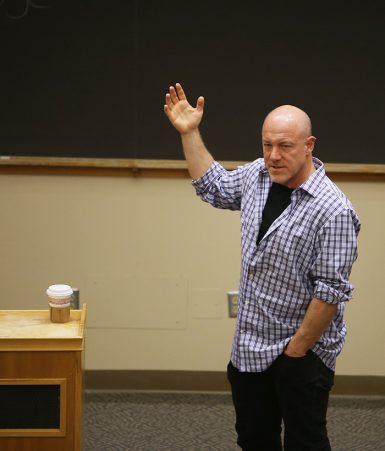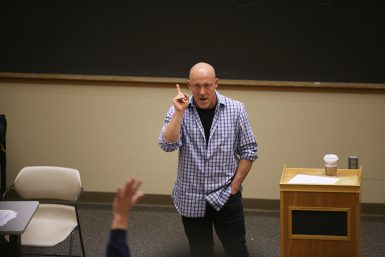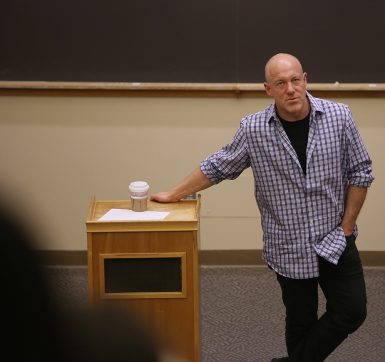NYT’s Leibovich discusses covering politics, profile writing

Barack Obama, Donald Trump and Hillary Clinton are only a few of the politicians Mark Leibovich has interviewed throughout his career.
Monday night, he told students about his experience covering politics in Washington, D.C., and profiling hundreds of political figures. He quickly used an analogy he knew would resonate.
“Politics in Washington is like covering basketball at IU,” Leibovich said. “It’s the game.”
Leibovich is the National Magazine Award-winning chief national correspondent for The New York Times Magazine. He spoke to students in professor of practice Tom French’s Behind the Prize class about interviewing powerful political figures and his writing process.
Each week, students in the class hear from media professionals who have won or been finalists for top prizes. French, a Pulitzer Prize-winner reporter himself, devised the class several years ago as a way to allow students to learn how excellent journalism projects evolve.
“I’ve been a fan of Mark’s work for a long time, and then I read his piece this summer, ‘Will Trump Swallow the G.O.P. Whole? https://www.nytimes.com/2016/06/26/magazine/will-trump-swallow-the-gop-whole.html’” French said when introducing Leibovich. “It just burned a hole in my laptop. I was so excited I emailed Mark on the off chance we could lure him into Bloomington.”

Known for his profiles, Leibovich said he looks for interview subjects who are represent an interesting moment in politics. He said he also is biased toward honesty and anyone who is vulnerable, he said. For example, he won his National Magazine Award for his profile http://www.nytimes.com/2010/04/25/magazine/25allen-t.html of Mike Allen of Politico, the man many politicians consider one of the most powerful journalists in the capital right now. He said he prepares for interviews, but instinct is a guide, too.
“There are moments, and this is where the big list of questions that you prepare isn’t going to get you anywhere, when you just have to instinctively let yourself try to bring the person to the place where they are going to reveal something,” Leibovich said.
Recording interviews has helped Leibovich become a better interviewer, he said, not only because of accuracy but as a way to learn to be a better interviewer. When he listens to his recordings, he hears the times when he should have asked questions differently or stopped interrupting and let the subjects speak more.
Political profiles should be as engaging as any other kind of story, he said. Regardless of the tone of the story — serious, poignant – lively writing should be an element of any good story.
As with all writers, though, he said he does get stuck. All writers fear bad work, and Leibovich said he overcomes this just as students in the class do.

“I’m always second guessing,” Leibovich said. “I’m always rereading. I can’t really sit down and work unless I’m rewriting something from the previous day.”
As for young journalists who aim to cover politics, he urged them to stay out of political bubbles. The immediate temptation is to immerse yourself in the beat of the candidate, office or statehouse you are covering. But reporters do their best work when they are by themselves seeking our their own subjects.
“You’re not a political reporter,” he said. “You’re a reporter of human beings with very real frailties doing very scary things.”
The biggest challenge? Finding the next story, he said. He encouraged students to err on the side of risk-taking in their reporting and not be afraid of making mistakes, because the best journalism is often unconventional.
“This is a room full of awesome, potential journalists, and there are rooms like this in a lot of places, and I think it’s a good moment,” he ended. “I think there’s this real energy on the side of journalism.”
Junior Michelle Davis said she chose to take Behind the Prize because of speakers like Leibovich. The class is an opportunity to hear from professionals who have been “out in the field,” and she appreciates the advice they can offer.
“Mark really thought about what we were asking,” said Davis. “It’s always nice to hear what someone who has been a journalist for a long time has to say.”
More:
- Read about previous speaker Yannis Behrakis.

